What you need to know
The U.S. presidential election is being keenly watched across Asia. The victory of former President Donald Trump over Vice President Kamala Harris will have a major impact on America's relations with the region on issues like trade, security and climate change.
BenarNews and Radio Free Asia reporters are gauging reactions in Asia and regularly updating this post with what we hear from regular citizens and from governments.
Cambodian prime minister cites U.S. role ‘in promoting stability’
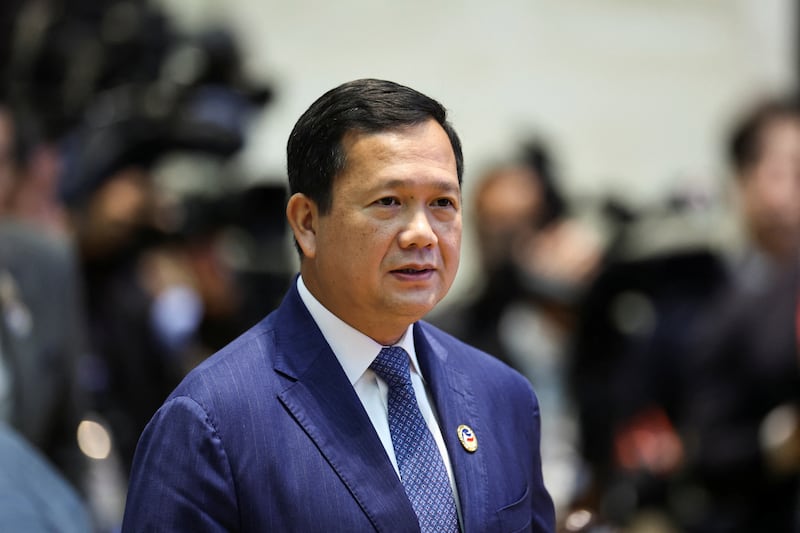
Prime Minister Hun Manet congratulated Trump on his “great victory,” which he called a “true testament to the trust and confidence that the American people have in your leadership.”
“Your return comes at a most crucial time not only for the American people but for the world at large,” he wrote. “Under your wise leadership, I am confident that the indispensable U.S. role in promoting stability, security and prosperity will be further strengthened.”
Hun Manet became prime minister last year when his father, Hun Sen, stepped down after three decades in power.
Earlier on Wednesday, Hun Sen posted a message saying that Trump’s victory showed “that the American people love peace, rather than going to war entirely with Ukraine and Israel.”
Posted at 12:40 p.m. Eastern on 11/6/2024.
Tibet’s government-in-exile greets Trump’s victory
The spokesperson for the Central Tibetan Administration, Tenzin Lekshay, said in a statement that the “administration and the Tibetan people extend our congratulations to Donald Trump on his election win. In the next four years of his presidential term, we wish that he has a successful presidency.”
The Central Tibetan Administration is the Tibetan government-in-exile based in Dharamsala, India.
Posted at 12:02 p.m. Eastern on 11/6/2024.
Indian prime minister posts ‘heartiest congratulations’
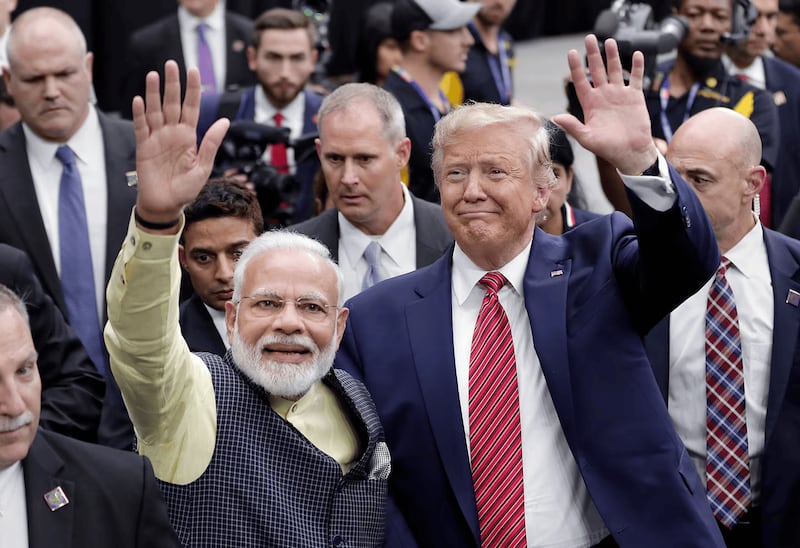
A message from Indian Prime Minister Narendra Modi on X, formerly known as Twitter, called Trump “my friend” and greeted his “historic victory.”
“As you build on the success of your previous term, I look forward to renewing our collaboration to further strengthen the India-US Comprehensive Global and Strategic Partnership,” Modi wrote. “Together, let’s work for the betterment of our people and to promote global peace, stability, and prosperity.”
The new Trump administration will likely deepen ties with India, according to a retired professor of international relations department at Dhaka University.
“Trump and Modi have a good personal relationship. So there are possibilities that Trump’s view on Bangladesh would be influenced by India,” Imtiaz Ahmed told BenarNews.
Meanwhile, the analyst said he doesn't believe that the U.S. government will seek the removal of the interim administration led by Muhammad Yunus and reinstall Prime Minister Sheikh Hasina, who lost power in August.
Posted at 11:57 a.m. Eastern on 11/6/2024.
Filipino hotel worker looks ahead to Trump’s China policy
Reactions from Asia: U.S. election watchers in the Philippines.
Posted at 11:45 a.m. Eastern on 11/6/2024.
Bangladesh’s former ruling party welcomes Trump’s election win
Awami League, Bangladesh’s former ruling party, welcomed Trump’s poll victory and urged him to “establish global peace.”
“The Biden administration has spread wars across the world and escalated violence. We hope the new U.S. government will not follow them and work to establish global peace,” said Bahauddin Nasim, joint general secretary of the Awami League.
“Donald Trump’s tweet on the attacks on the minority communities in Bangladesh days before the election has proved that he is in favor of peaceful coexistence of all faiths and beliefs and peace,” said Nasim.
“Due to his tweet, we can hope that [Trump] would extend his support to restore the democratic process in Bangladesh and establish the rights of all communities,” he added.
Posted at 11:27 a.m. Eastern on 11/6/2024.
Malaysian economist foresees big impact on trade, global supply chains
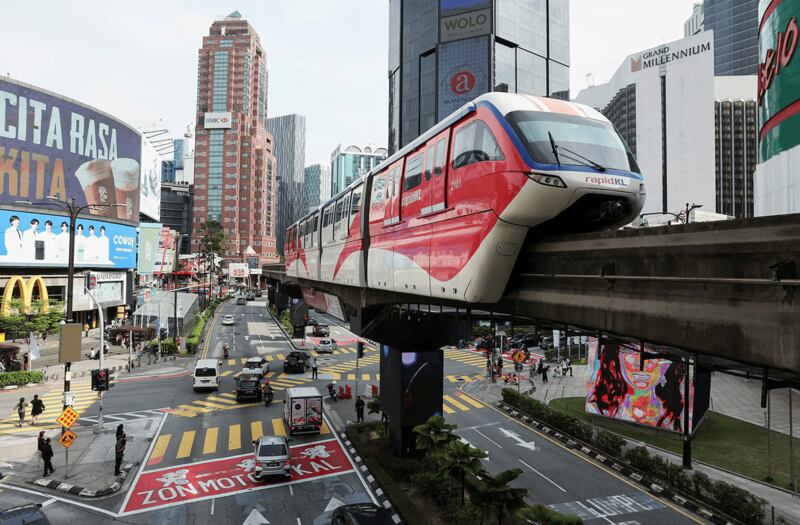
For Malaysia, the election outcome will likely have far-reaching consequences – especially in trade and investment, according to Samirul Ariff Othman, an economist and a senior consultant at Global Asia Consulting.
Harris would have focused on U.S.-ASEAN relations, enhanced market access and lower trade barriers, which would have boosted regional economies like Malaysia, he said.
On the other hand, a Trump victory will reignite protectionism, complicating trade relations with China, Othman said. This could indirectly impact Malaysia, whose Electrical & Electronics sector is heavily entwined with global supply chains.
But Malaysia may see a silver lining in the long run if trade and investment flows continue to divert from China, he said.
Malaysia’s exports to the U.S., for instance, have already jumped by 17.6% this year alone, a trend that could continue if Trump’s policies intensify the U.S.-China economic rift.
“Malaysia could further position itself as an appealing hub for Northeast and Southeast Asian investments. We could act as a bridge between Eastern and Western markets – a role we could play post-U.S. election,” Othman said.
Posted at 10:59 a.m. Eastern on 11/6/2024.
In Laos’ capital, some optimism despite proposed trade restrictions
Several residents of Vientiane said they were optimistic regardless of the change in the U.S. leadership even though Trump could reintroduce trade barrier policies that could indirectly affect small countries like Laos that have economic ties to both the U.S. and China.
“I personally think Trump’s policy would be more supportive of Laos, given its focus on revitalizing the domestic [economy] and the public boredom of war,” an office staff member who asked not to be named because of Laos’ generally rigid views on speaking to the media.
A young man, however, said he appreciated Biden’s successor for the administration’s advocacy of education and its funding of vocational skill development programs for Laotian youths.
“The business community here was rooting for Harris because of their free policy and unity. We don’t want changes.”
Posted at 10:31 a.m. Eastern on 11/6/2024.
Bangladeshi student urges change on U.S. stance on Israel
Reactions from Asia: Bangladeshi student Efatara Era speaks about the expectations of the next Trump presidency.
Posted at 10:06 a.m. Eastern on 11/6/2024.
Users of China’s Weibo contemplate tariffs, war over Taiwan
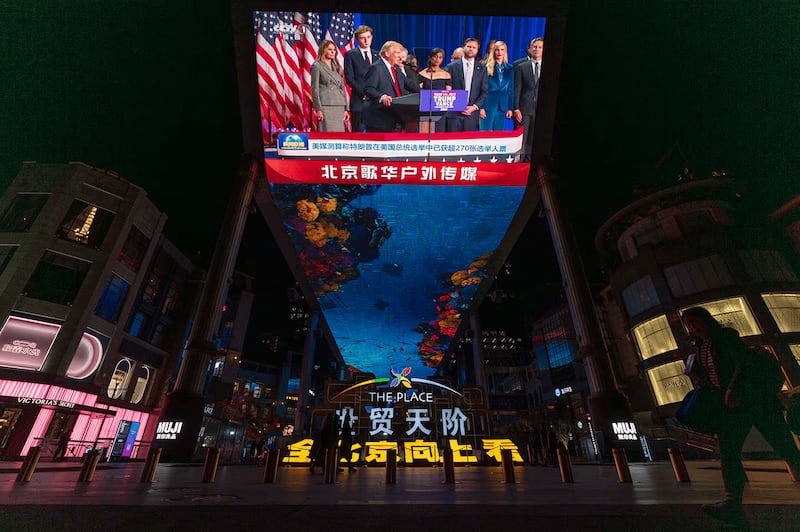
Chinese social media users were commenting in large numbers as the U.S. election result topped the Weibo list of search terms at 1300 GMT on Wednesday, with some believing that Trump’s tariffs pledge would make life harder for China, or would make global conflict more likely, while others seemed disengaged from the result.
“No matter who won, there wouldn’t be peace,” commented Weibo user @Miss_Darcy under a post on Trump’s declaration of victory from state broadcaster CCTV, while @Komi9893 replied from the southern province of Guangdong: “Trump ... only cares about America, not other countries ... Trump will impose more economic and technological blockades on China, forcing more international companies to stop cooperating with us.”
@I-wanna-get-rich-overnight commented from the northern province of Hebei: “The car of the American Empire is now self-driving, so it will be the same regardless of who gets on board.”
“What does this have to do with China?” @Orange_flavored_wine wanted to know, while @befighting020 added: “Yes, no matter who wins, it’s all about their own interests.”
But @Tangyuan Xiaoji commented that developments in the United States would have an impact on global politics and conflict.
“If there is a war, China will still have to support other countries quietly, so how can you say that a war has nothing to do with China?” they said.
@Soma had some trade concerns, commenting: “Tariffs will be raised on China, there will be a trade war, and China will find trade with Europe and the United States gets very difficult as there will be countless sanctions.”
“Everyone is already having a tough time, and things are going to get even more difficult now,” the comment said.
Posted at 9:56 a.m. Eastern on 11/6/2024.
Bangladesh’s interim leader congratulates Trump, hopes for better Dhaka-Washington ties
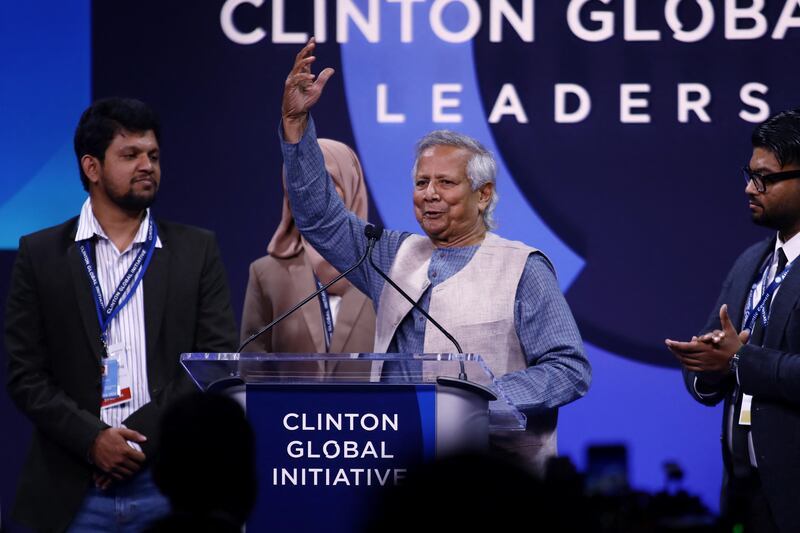
Bangladesh’s interim government chief advisor Muhammad Yunus congratulates Trump on his election victory, and hopes for better ties between the two countries under his term.
“Bangladesh and the United States share a long history of friendship and collaboration across numerous areas of mutual interest,” Yunus said in a message.
“The relationship continued to grow in depth and breadth during your previous term in office. I look forward to working together to further strengthen our partnership and foster sustainable development,” he added.
Posted at 9:36 a.m. Eastern on 11/6/2024.
Taiwan’s president issues congratulatory message
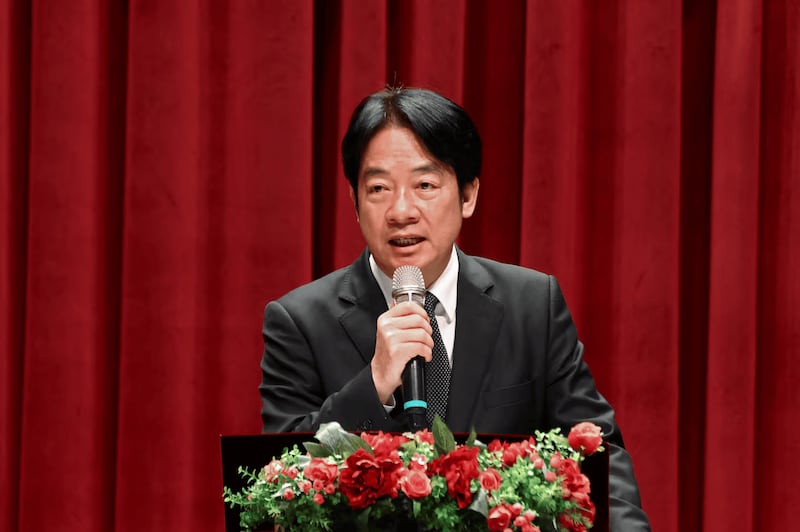
Taiwanese President Lai Ching-te congratulated Donald Trump and J.D. Vance on their election as the 47th President and Vice President of the United States, while thanking President Joe Biden and Vice President Kamala Harris for their “firm support” for Taiwan.
Presidential Office spokesperson Karen Kuo said the island’s government “will work together with the new U.S. administration and Congress to create a new situation in Taiwan-U.S. relations.”
“We will work continue to work closely with the United States for the security and stability of the international community,” she said, adding that the bilateral relationship was based on common values and a belief in freedom and democracy, and had continued to “progress and deepen” in recent years, regardless of which political party was in power.
Posted at 9:31 a.m. Eastern on 11/6/2024.
In Indonesia, hope for role in preventing conflict with China
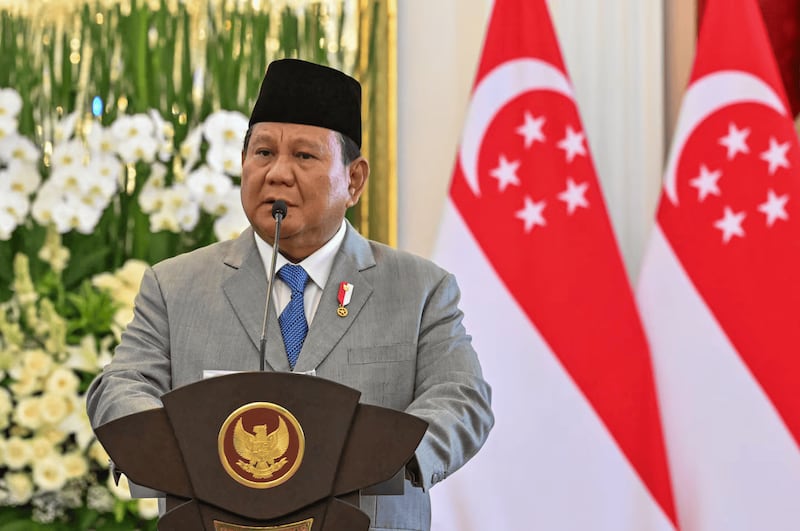
Adam Nurrachman, a teacher in Bekasi, near Jakarta, said Indonesian President Prabowo Subianto, who is fluent in English and experienced in diplomacy, could leverage his position to maintain regional stability.
“Our hope is that Indonesia can play a role in engaging with the U.S. to prevent conflict in Southeast Asia,” he said. “Indonesians don’t want a war between the U.S. and China near our borders.”
Poltak Partogi Nainggolan, an international affairs analyst with Indonesia’s National Research and Innovation Agency, argued that under Trump, the U.S.’s traditionally multilateral approach would weaken, likely destabilizing key regions.
“A Trump presidency would see Europe’s security erode as NATO faces stress from his lenient stance on Russia. In the Asia-Pacific, particularly in the South China Sea, tensions would likely rise due to Trump’s inward-focused policies,” he told BenarNews.
Muradi, a professor of political and security studies at Padjajaran University in Bandung, suggested that Indonesia could advocate for a forum of medium-power nations.
“Without such an initiative, we risk being drawn into the U.S.-China rivalry,” he said. “Our recent entry into BRICS already places us between these superpowers. Indonesia should prioritize diplomacy to avoid being caught up in potential conflicts if Trump wins.”
Posted at 9:06 a.m. Eastern on 11/6/2024.
Philippine president congratulates Trump, hopes for ‘unshakeable’ alliance in region
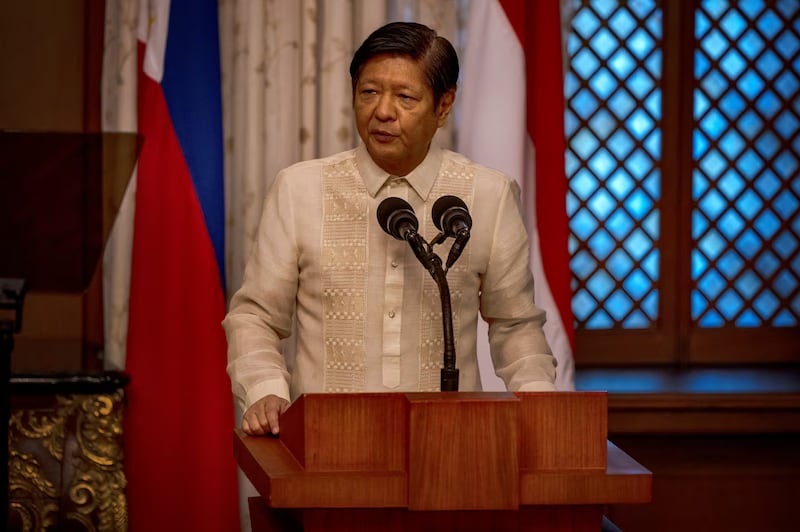
President Ferdinand Marcos Jr. congratulated Trump following his election victory, expressing optimism for a more fruitful and dynamic partnership between the Philippines and the U.S.
“We look forward to working with President Trump on a wide range of issues that will yield mutual benefits for two nations with deep ties, shared beliefs, a common vision, and a long history of working together,” Marcos said.
“I am hopeful that this unshakeable alliance, tested in war and peace, will be a force for good, blazing a path of prosperity and amity in the region and on both sides of the Pacific,” he added.
Posted at 7:45 a.m. Eastern on 11/6/2024
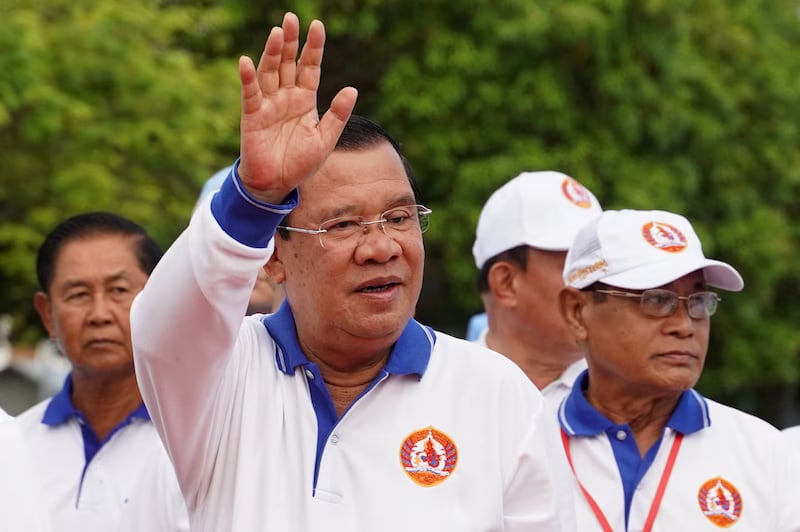
Cambodia’s Hun Sen says America not ready for a woman leader
Veteran Cambodian leader Hun Sen said Americans were not ready for a woman president.
“American society is not ready to take women as its leaders, even though the United States is the father of gender democracy,“ Cambodian Senate leader Hun Sen said on his Facebook page.
Hun Sen, who stepped down as prime minister last year to be replaced by his son, Hun Manet, said Trump’s victory showed his message of peace to the world resonated with voters.
“Trump’s victory shows that Americans love peace rather than having an outright war in Ukraine and Israel.”
Posted at 7:32 a.m. Eastern on 11/6/2024
Malaysian prime minister congratulates Trump
Malaysian Prime Minister Anwar Ibrahim congratulated Trump “on his remarkable political comeback and victory.”
“This new chapter brings renewed opportunities, and we’re ready to move forward with optimism, collaboration and shared purpose,” he said.
Posted at 6:30 a.m. Eastern on 11/6/2024
Feelings mixed in military-ruled Myanmar
A Myanmar military veteran who declined to be identified said Trump was unlikely to intervene in his country, which has been in chaos since a 2021 military coup with pro-democracy forces battling to end rule by the generals.
“I’m someone who really respects Donald Trump’s personality,” said the former military man. “As an economist, he’s someone who will really pay attention to the economy, not just the remaining general things. If it’s related to Myanmar’s position, they won’t be sending any intervention.”
But political analyst Hlay Kyaw Zaw was wry about a more isolationist United States under Trump.
“If Donald Trump wins, it won’t be easy for the world … Because Trump said he will only pay attention to America and just cut out the rest. He even said he’d leave NATO,” Hlay Kyaw Zaw said.
“He won’t pay any attention to Myanmar’s affairs. For Democrats, since Obama and Hilary’s time, they were deeply involved in Burma. If they are Democrats, I think they will definitely do something to support Myanmar.”
Kyaw Zaw, spokesperson of the office of the president for the shadow National Unity Government, set up by pro-democracy politicians in self-exile, was more circumspect.
“Democrat or Republican, they’ll help Myanmar affairs. We’ll cooperate with whoever gets elected as president, the president and legislature that gets elected,” Kyaw Zaw said.
Posted at 5:09 a.m. Eastern on 11/6/24
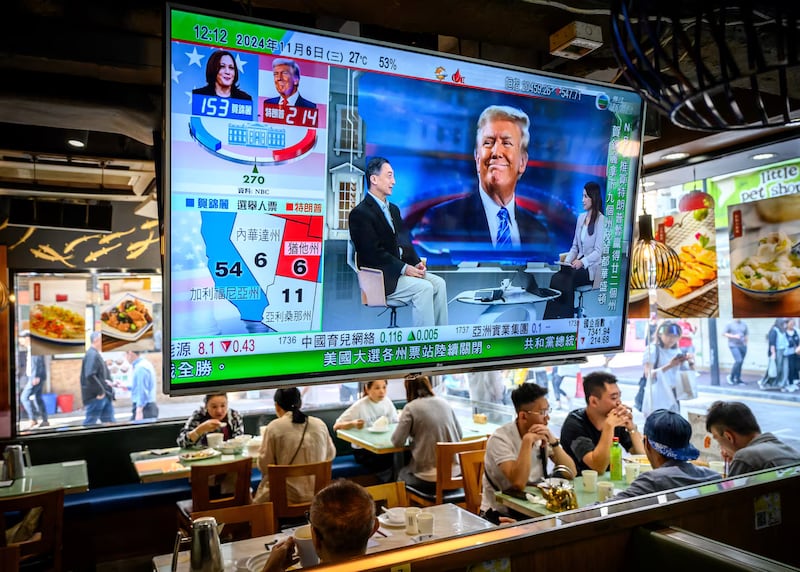
China looks for U.S. cooperation; media blames ‘US hawks’ for strained ties
China has refrained from commenting on the U.S. election, insisting it is its internal affair, and called on Wednesday for respect and cooperation but its state-controlled media has reflected concerns and hopes, with one newspaper calling for the new president, whoever it may be, to stop a deterioration in ties.
“We will continue to view and handle Sino-U.S. relations in accordance with the principles of mutual respect, peaceful coexistence, and win-win cooperation,” foreign ministry spokesperson Mao Ning told a press briefing as reports indicated that Trump was heading for victory.
The China Daily, in a commentary titled " Onus on new US president to improve ties," expressed frustration with "U.S. hawks" for the deterioration in Sino-US relations.
"No matter who wins the election, the result will have a far-reaching impact on the world, not least because the winner will decide the U.S.'s China policy," Chinese academics Fu Suixin and Ni Feng wrote in the commentary.
Both of the U.S. presidential candidates had played the “China card” to win votes, the academics said.
While U.S. voters “generally do not understand or care about foreign policy, the country’s elites have always formulated the foreign policy and shaped public opinion,” they said.
“Both Democrats and Republicans make China a scapegoat for the U.S. domestic mess,” they wrote. “The voters have to pay the cost of the deteriorating China-U.S. relations.”
Posted at 5:10 a.m. Eastern on 11/6/24
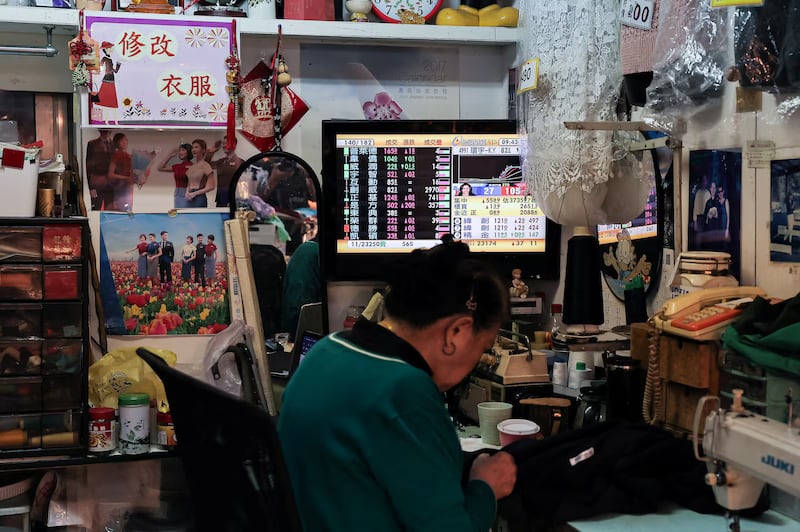
Confidence in Taiwan; some see Trump tougher on China
Taiwan businessman Kenneth Tse said he was confident that Taiwan-U.S. relations would remain strong no matter who won.
“Over the last few years, a de-facto alliance has been established in this part of the world between us, Japan, the U.S., and other countries, and it will remain for the foreseeable future,” Tse said.
“Whoever takes office will have to fulfill the U.S. commitment to provide us with the arms and equipment for us to protect Taiwan, simply because we’ve already paid for the order. As far as China is concerned, I don’t think the U.S. election results would trigger some immediate actions by Beijing.”
Another man in Taiwan, who identified himself as just Lee, said he thought Trump would be better president than Harris.
“He’s tougher on China and he is not easily dissuaded. But of course, he is unpredictable and we can’t ever be sure what he’ll do in future. However, he is pragmatic and doesn’t yield to pressure,” Lee said.
On Harris, he said: “I have the impression that she could be persuaded by China, so she’s not a good choice.”
“Whatever outcome of the election, China won’t react by taking action against Taiwan, because Xi Jinping himself is under a lot of pressure, such as from the border conflict with India,” Lee said, referring to China’s president.
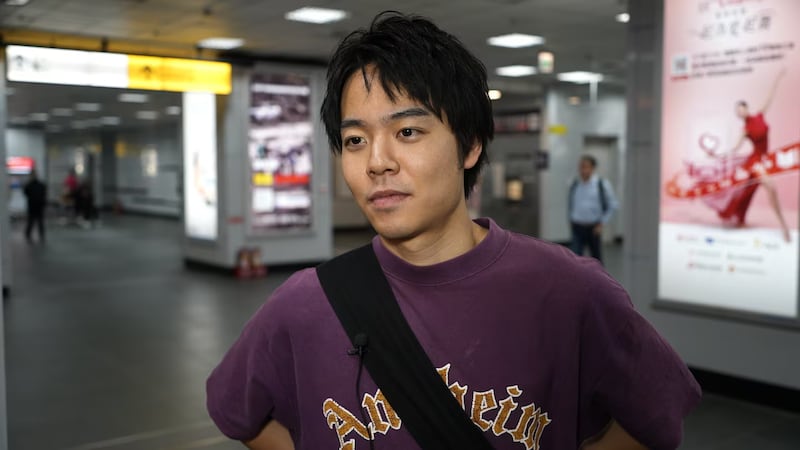
A Japanese student in Taiwan, who identified himself as just Lu, said he was hoping for a Trump victory.
“I feel that under him, America will be friendlier and more supportive of Japan, especially when we are facing tensions and there is a risk of war in East Asia. If Kamala Harris became president, that would be bad news for Japan as I think she doesn’t like Japan very much and doesn’t support us.”
Posted at 2:50 a.m. Eastern on 11/6/24
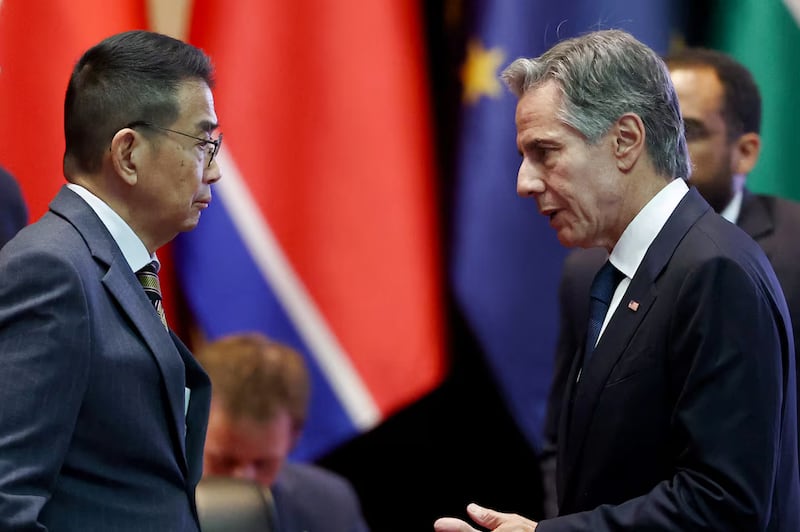
Thailand looks to fair cooperation
Thailand is looking forward to a stable strong relationship with the United States no matter who wins, Foreign Minister Maris Sangiamponsa told a news conference.
“This is Prime Minister Paetongtarn’s policy, for Thailand to play a role on the world stage, not to be the one dictated to on anything,” Maris said, referring to Thailand’s second woman prime minister, Paetongtarn Shinawatra.
“The government wants to see good cooperation between Thailand and all countries, and it must be fair, based on fair cooperation for the benefit of both.”
U.S. Ambassador to Thailand Robert F. Godec echoed that, saying regardless of the election outcome, the U.S. would remain Thailand’s strong partner.
“We will maintain our important relationship, which is like a fabric woven from our ties in trade, investment, security, education, and people-to-people connections,” he told the media in Bangkok.
“Thailand was America’s first friend in Asia, and our diplomatic relations date back more than 190 years. None of that will change.”
Posted at 2:30 a.m. Eastern on 11/6/24
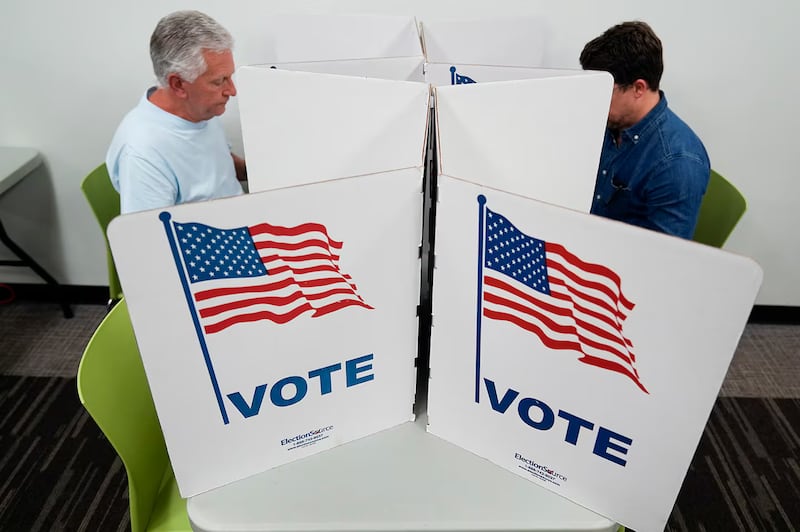
Differing approaches
Trump and Harris have offered sharply different prospects for America's engagement with Asia and the rest of the world.
Harris campaigned mostly on continuing the Biden administration’s focus on U.S. relationships in Asia, which seeks to deftly “manage” the growing rivalry with Beijing while building tight-knit alliances with other Asian countries worried about China’s growing military might.
Trump, by contrast, has spent less time detailing an orderly approach to foreign policy to instead argue that world leaders such as Chinese President Xi Jinping and North Korea’s supreme leader Kim Jong Un respect him more than Biden or Harris, and that a personal touch will be what matters.
The two candidates also differ on trade: Trump has threatened across-the-board tariffs on all imports into the United States, including a 60% rate on Chinese imports.
Harris said that would fan inflation. She says a more targeted series of tariffs, which are intended only to shore-up U.S. production of key items like solar panels, batteries and electric cars, is more appropriate.
[ Read more of this storyOpens in new window ]
Posted at 4:38 p.m. Eastern on 11/5/24
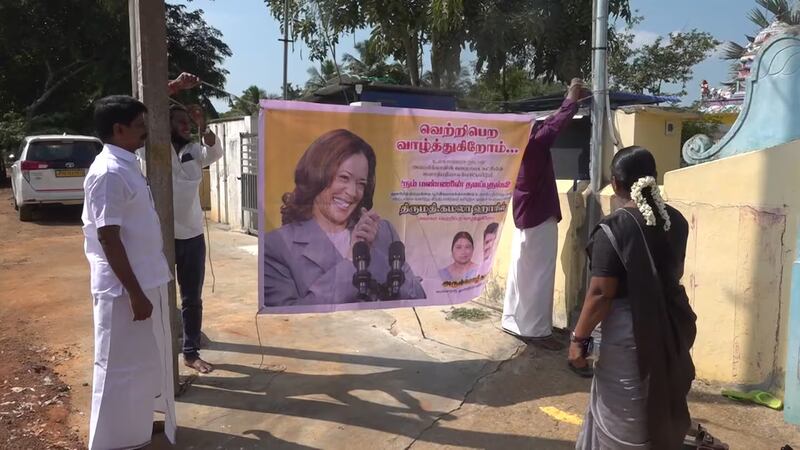
Hopes run high in Harris’ ancestral village
A tiny village on the other side of the world in the south Indian state of Tamil Nadu has been offering prayers at its Hindu temple, hoping for victory for one of their own, Vice President Kamala Harris.
Harris, 60, was born in California to an Indian mother and Jamaican father, both of whom immigrated to the United States for higher education.
In the village of Thulasendrapuram – where Harris’s maternal grandfather Painganadu Venkataraman “P.V.” Gopalan was born – residents have been gathering each day at the village temple to offer special prayers to the Hindu deity Ayyanar – worshipped in rural parts of Tamil Nadu as a guardian or protector – to watch over Harris.
The residents refer to Harris as the “daughter of the land,” and say they feel a deep connection with her because of her ancestral ties to the village.
The village is decked out with signs featuring Harris‘s portrait and banners wishing her good luck in the election, which will determine whether or not she will become America’s first female president and first president of Indian descent.
“We in this village offer daily prayers for Kamala Harris to win the election,” Aruna Murli Sudhagar, the leader of the village, told Radio Free Asia.
[ Read more of this storyOpens in new window ]
Posted at 5:13 p.m. Eastern on 11/5/24
Explore our election coverage
[ Live U.S. election mapOpens in new window ]
Trump vs. Harris: Who do South and Southeast Asians want as the next US president?
US presidential elections: Implications for Manila-Washington alliance, South China Sea
[ China focuses on threat of violent unrest as US voters head to pollsOpens in new window ]
[ US presidential election sparks curiosity in North KoreaOpens in new window ]
Vietnamese show interest
Interest in the election has been huge in Vietnam. Almost all big media outlets including public broadcaster Voice of Vietnam and the National Assembly TV channel ran live coverage of the election with panels of analysts.
Social media platforms have also been abuzz about the two candidates, with at least three newspapers are asking, “Who will be elected U.S. president?”
Nguyen Binh, a farmer in the southern province of Dong Nai, expressed surprise that Americans were free to talk openly about elections. He recalled that a number of independent candidates in Vietnam’s 2016 National Assembly election are in prison.
“I only wish for one thing: that talented people in Vietnam and virtuous people in Vietnam can run for election fully, openly, and run comfortably without being coerced,” he said. “The right to self-determination belongs to the people with their votes, not from any political party.”
Independent journalist Nam Viet said he believes that the interest shown by Vietnamese demonstrates their thirst for democracy.
“The commenting, judging, choosing sides... of Vietnamese people in the U.S. election is sometimes funny, but it shows that a desire for change is still smoldering in the hearts of the nation,” he said.
“The people must be rehearsing their right to self-determination,” Nam said, saying Vietnam holds “sham” elections.
Posted at 5:34 p.m. Eastern on 11/5/24
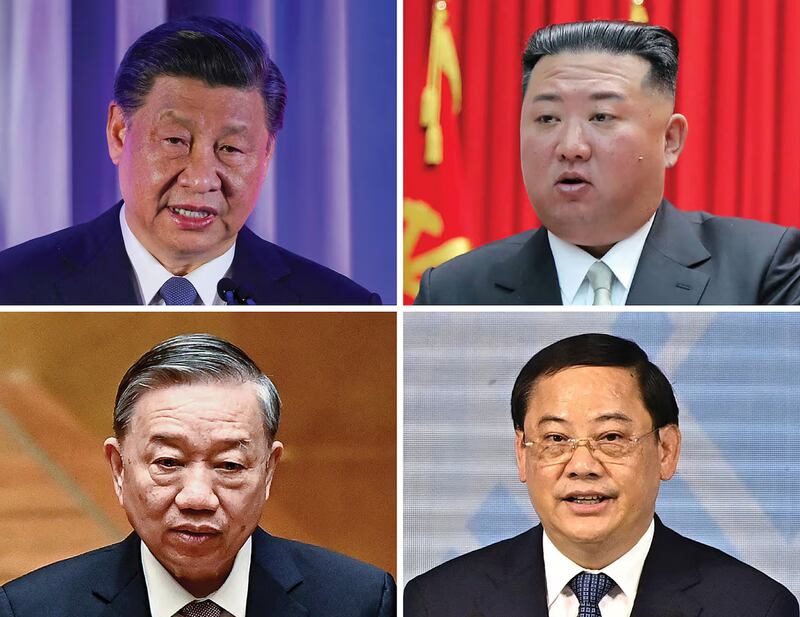
How do elections work in authoritarian Asian nations?
In a world bracing for a close U.S. presidential election result this week, a large swathe of Asia picks its leaders without suspense -- and mostly with little popular participation.
Chinese President Xi Jinping was confirmed by the National People’s Congress in March 2013 with 2,952 votes for, one against, and three abstentions. Last year the rubber stamp parliament voted unanimously to give him a third term, putting him on track to stay in power for life.
North Korea’s leaders have inherited their power from father to son for three generations. They are technically “elected” – but there is no choice. In 2014, Kim Jong Un was elected to the Supreme People’s Assembly without a dissenting vote with 100% turnout.
Fellow communist states Laos and Vietnam pursue their own variations of the same Marxist-Leninist party-state model copied from the Soviet Union, with Hanoi avoiding strongman rule in favor of collective leadership.
Cambodia has been dominated by the ruling party of Hun Sen, who banned the main opposition parties in the previous two parliamentary elections.
Myanmar held a credible multi-party election in November 2020, a vote that delivered a strong majority to the National League for Democracy of de facto national leader Aung San Suu Kyi. But the military didn’t like the results and staged a coup on Feb. 1, 2021.
[ Read more here.Opens in new window ]
Posted at 5:05 p.m. Eastern, 11/5/2024
